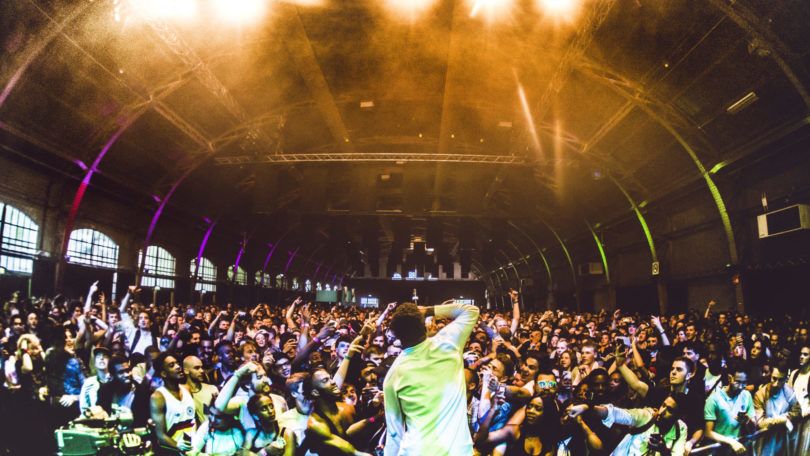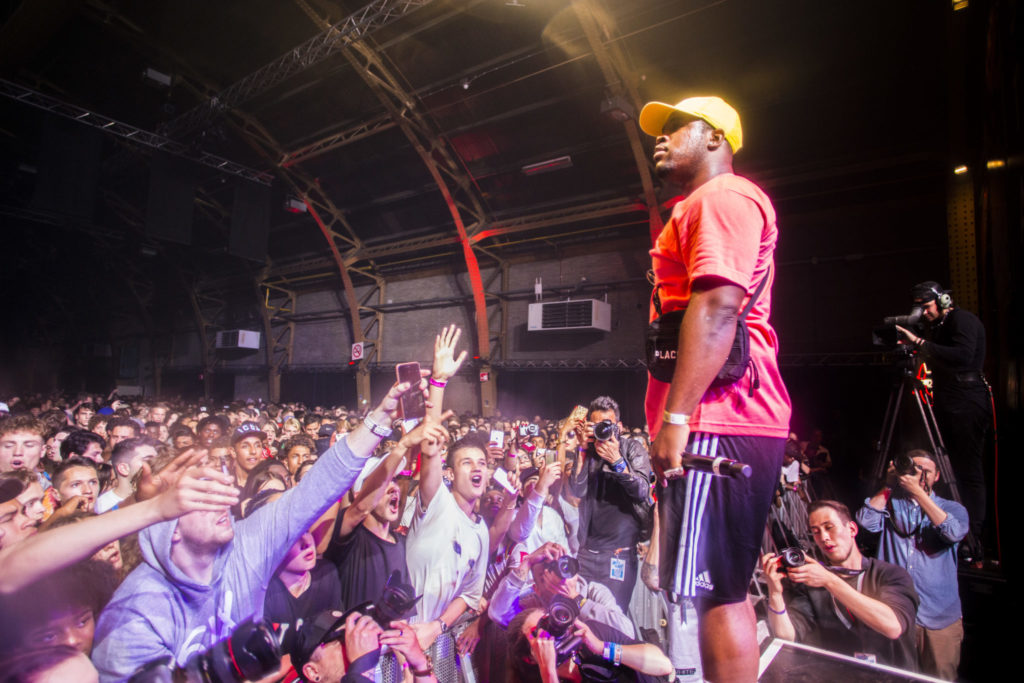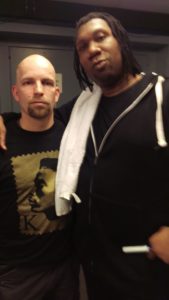Professor on hip-hop
-
 Mick Jenkins at WOO-HAH! Photo: Rein Kooyman
Mick Jenkins at WOO-HAH! Photo: Rein Kooyman
Hip-hop is probably the most popular and most hated musical genre of the moment. Why? Vox decided to find out by visiting WOO HAH!, the famous Dutch hip-hop festival, together with Professor of Spanish Literature Maarten Steenmeijer: 'The audience is a breath of fresh air!'
Hip-hop is no longer used only to make movie scenes in dark street corners more frightening. On the contrary: it has grown into the most popular musical genre in the world. Or in any case the one most listened to – if we are to believe the number of streams on Spotify and YouTube.
Hip-hop is the most popular musical genre in the world
And yet not everyone is ready to embrace hip-hop. For generations the Dutch rap culture has been complaining that ‘Hilversum’ (where the Dutch media park is, ed.) ignores them. And this complaint has only grown louder in recent years, with the Eindhoven rapper Fresku as its main spokesman. Last year, Wilbert Mutsaers, the head of concert organiser Mojo, threw more oil on the fire by complaining that the programmes of the large Dutch festivals are much too white. Less Stones, more Kanye West – that was his message.
Representative of the split hip-hop seems to be caught up in was the 2015 Pop Award, awarded – very progressively – to the hip-hop collective New Wave. But – very conservatively – before the winners could play three notes, half the audience had left the premises out of disinterest and/or protest. On the one hand hip-hop is incredibly popular, on the other hand it evokes more resistance than any other musical genre.
Johan Derksen
To investigate why this might be the case, together with Professor of Literature Maarten Steenmeijer Vox went to the most prestigious hip-hop festival of the Netherlands: WOO HAH! in Tilburg. What are we to do with this hip-hop stuff? What makes it so attractive? And is the genre given enough recognition?
Steenmeijer is a lover of old-school music. His favourite band is The Byrds, from the 1960s.
Steenmeijer has written a lot of books on pop music, with Golden Earring as the main subject. His favourite music genre is Americana. To be clear: this is also the favourite musical genre of footballer and Blues fanatic Johan Derksen. Just so you know where we stand, as far as street credibility and rap interest are concerned.
And yet Steenmeijer gladly joins us on our hip-hop adventure. ‘I remember years ago reading enthusiastic reviews about a Kanye West album in de Volkskrant and NRC. They called it the Sgt. Pepper’s of hip-hop. I remember thinking: “I guess I’ll have to keep an eye on it.” Hip-hop’s really become impossible to ignore.’
So off to Tilburg we go. Steenmeijer is dressed for the occasion, with a leather jacket. And yet he still very much looks like the odd man out. There are few men over fifty, he addresses the bar staff overly politely, and we can safely assume that he is the only professor. The audience is young and mostly male, but otherwise very diverse.
‘A breath of fresh air’, says Steenmeijer. ‘In so many places I am shocked at how white the audience is. Sometimes in LUX, I just sit there wondering whether the world is solely populated by white people. Apparently hip-hop is a genre that brings people from various backgrounds together. That’s remarkable in view of how polarising the lyrics are. If you’re not black, you’re a nobody. An interesting paradox!.’
 The hood
The hood
Once inside, we start on our round of the podiums. Our first stop is Sevn Alias, the wonder boy of Dutch hip-hop. Steenmeijer doesn’t understand much of the lyrics. ‘Is this about Nelson Mandela?’ We then move on to artists such as Action Bronson, Tyler the Creator, Opgezwolle and ASAP Ferg. Steenmeijer is having fun, he looks left and right and sips on his beer. But it is telling that he only really comes to life when he gets the opportunity to tell a dirty joke about one of Paul McCartney’s exes (‘a first-rate bitch’).
During some of the songs the professor gently nods his head to the beat. Not that things get really rough or anything – the Vox delegation remains at a safe distance from anything that might turn into a mosh pit. ‘It’s a shame that Mac Miller couldn’t make it’, says Steenmeijer – who apparently did secretly prepare for his rap adventure.
At the end of the day Steenmeijer takes stock on the festival press balcony. ‘From the audience here I can conclude that hip-hop is mainly popular among young people. I understand that. The macho culture surrounding it doesn’t appeal to me much. I know it’s all a game, but for boys like my son – who don’t really come from the hood – it’s of course very interesting. There are lots of fun terms in it, in a different language, from people from a different social class. This can lead to an interesting identity game for young people.’
For Steenmeijer, the numerous references to ‘bitches’, ‘shooting niggas’ and ‘dealing dope’ are incidentally no reason to dismiss the genre. It’s all part of the game, he says. Americana music is all about cheap cowboy hats and rednecks on white horses. Also a horrid little world, according to Steenmeijer, but he still finds it attractive.
And the same is true of hip-hop. ‘Look, I can think of hundreds of reasons to completely dismiss this genre. And I certainly didn’t turn into a hip-hop fan. But many raps play wonderfully with language and WOO HAH! attracts people you will never see at Pinkpop – and if only for this reason we should take it seriously. I think it’s unavoidable that hip-hop will become much more mainstream in the future. An entire generation is already growing up with this music. My parents weren’t cheering when The Beatles or the Stones came on – just as I’m not cheering now. But if the current generation remains as faithful to their musical tastes as the youth of my day did, in thirty years’ time hip-hop will be an omnipresent and highly respected musical movement.’
[kader-xl]Hall of Fame
Cis van Beers is a hip-hop expert. In addition to being a Nijmegen alumnus in Business Communication, he is also an avid fan and owner of the Hip-hop Golden Age website, which is in turn connected to the Hip-hop Hall of Fame in New York. As a teenager, Van Beers would drive on his scooter to the record store to get the latest record by Ice-T. Now he is invited by the rapper to attend his LA concerts backstage. In other words: he knows what he’s talking about.
 Van Beers thinks that real hip-hop will never reach a wide audience. And funnily enough, this is indirectly the fault of a few of his great former hip-hop heroes. ‘The first hip-hop songs were all about partying and how cool the rappers thought themselves. N.W.A. changed all that when they came out with Straight Outta Compton. As did Dr. Dre with The Chronic. These artists launched the gangster rap style. At the time it was original and authentic. You heard stories from the street. It was about shooting people and drug trafficking. They probably did some of these things in real life, but of course none of them went around killing dozens of people – otherwise they would all have ended up in prison.’
Van Beers thinks that real hip-hop will never reach a wide audience. And funnily enough, this is indirectly the fault of a few of his great former hip-hop heroes. ‘The first hip-hop songs were all about partying and how cool the rappers thought themselves. N.W.A. changed all that when they came out with Straight Outta Compton. As did Dr. Dre with The Chronic. These artists launched the gangster rap style. At the time it was original and authentic. You heard stories from the street. It was about shooting people and drug trafficking. They probably did some of these things in real life, but of course none of them went around killing dozens of people – otherwise they would all have ended up in prison.’
Gangster rap was such an incredible commercial success that many rappers began to imitate it, as they continue to do to this day, with much success. Van Beers sighs. ‘All those guys with ‘little’ in front of their names… it’s all imitation – I call them bubble-gum rappers. But because they are commercially interesting, they get all the attention. And this is of course deadly for high-quality hip-hop.’
‘Chuck D from Public Enemy says that in the past the best rappers automatically floated up to the surface. But now he thinks they are being kept out of the spotlight on purpose. He even sees it as a conspiracy: big media companies prefer to keep alive the negative image of drug-dealing, shooting black people, and so the bad gangster rappers get all the attention. How much of this is true is not something we can easily assess from over here.’
Van Beers has been following hip-hop since its widespread emergence midway through the 1980s. Then too a lot of rappers complained about being ignored by the mass media. ‘That will always be the case. The big radio stations prefer to play Drake – and all the other half R&B nonsense they call hip-hop. They only play really good rap during a short special hour, or on a side podium. Apparently it’s very difficult to sell real hip-hop to the general public. The masses consume what they are fed by the industry. And unfortunately that’s only gangster rap about bitches and ho’s. There is so much better hip-hop, but it’s only being listened to by fans and experts who know where to find it. I accepted a long time ago that this is just how it is.'[/kader-xl]
This story appeared in Vox magazine #9



